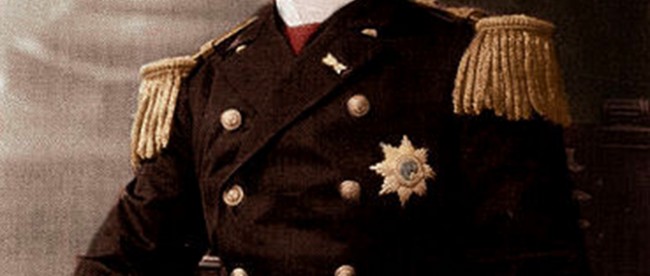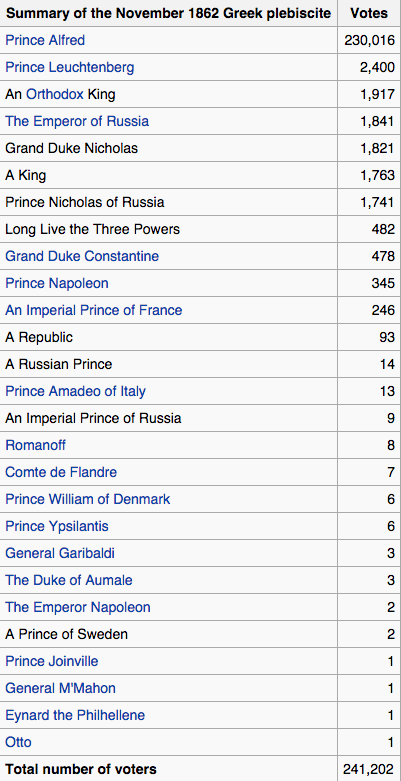The King Who Received Six Votes Out Of 240,000

The year was 1863 and Greece needed a new king. The problem: its old king, Otto, didn’t leave a suitable heir, in part because he wasn’t dead yet and in part because he wasn’t well liked. His ouster caused a gap in the monarchical system and there wasn’t a good way to solve it. So the Greek people decided to vote for a new king. Here are the results, via Wikipedia:

And the winner? Prince William of Denmark. Yes, the guy with six votes who is seventeenth on the list above, faring a few hundred votes worse than “Long Live the Three Powers.”
First off, let’s note that, usually, one does not vote for a monarch; those jobs are typically earned through inheritance or war. But until 1832, Greece didn’t have a king, in part because only a few years earlier, Greece wasn’t a nation in its own right. From 1821 until 1829, Greece was locked in a war of independence against the Ottoman Empire, which had previously ruled over the Greek peninsula. With military support from the Russian Empire, the United Kingdom, and France, the Greek revolutionaries prevailed, establishing an independent state.
From 1829 until 1831, the new nation was led by Ioannis Kapodistrias, a non-monarch governor who was by most accounts an effective one. But Kapodistrias was assassinated in October of 1831 and his successor, his brother, wasn’t nearly as good. Greece fell into disarray and the three powers that helped it win its independence — Russia, the UK, and France — stepped in. At what is now known as the London Conference of 1832, the three nations decided to turn Greece into a monarchy and selected a Bavarian prince named Otto Friedrich Ludwig to rule Greece as its king. He became Otto I, holding the Greek throne until 1862, when he was ousted by a popular uprising.
While the Greek population wasn’t fond of Otto, most were in favor of having a monarchy instead of a republic. Prince Alfred, the second-eldest son of the UK’s Queen Victoria (and at the time second in line for the British throne) was a popular first choice. To confirm the Greek interest in having him as a ruler, the nation held a referendum on the question. Eligible voters were asked to write in the name of their favored leader, and as seen above, Prince Alfred was the favorite in a landslide, taking 230,000 of 240,000 or so votes. But he’d never become the Greek king.
The London Conference had set forth eligibility rules for those selected to rule Greece, and one of them precluded Alfred from becoming the king. Members of the French, British, or Russian royal families were barred from taking the helm of Greece, likely in an effort to curtail closer relations with one of those nations than the other. That meant no Alfred for Greece, so the London Conference signatories looked further down the list. They settled on Prince William, the second-eldest son of Christian IX, heir presumptive to the throne of Denmark. Without controversy, the Greek parliament confirmed the selection. Prince William became King George I.
Despite these inauspicious beginnings, George I of Greece proved to be a popular ruler. He served his new nation for nearly fifty years before falling to a rogue assassin in 1913.
Bonus Fact: George I’s heirs ruled Greece until his great-grandson, Constantine II, was forced from the throne by a junta in 1973. (The monarchy was abolished shortly thereafter.) But George’s line went in reverse for a bit. George I’s son, Constantine I, ruled from his father’s death until the close of World War I, when he and his oldest son, George II, fled Greece. Constantine’s second son, Alexander (not the Great), became king but died three years later — he was trying to stop a fight between a dog and a monkey but the monkey fatally bit him. Constantine I returned to the throne, thereby succeeding his son. (He abdicated it again two years later, this time to George II.)
From the Archives: The Queen of Suite 212: How a Yugoslavian royal (who was part of the the Greek royal family, too), ended up giving birth in Yugoslavia without leaving the United Kingdom.
Take the Quiz: Name the kings of Greece. (If you read the above, you should be able to just about ace this one.)
Related: A book titled “A Concise History of Greece.” It’s 308 pages, though.
